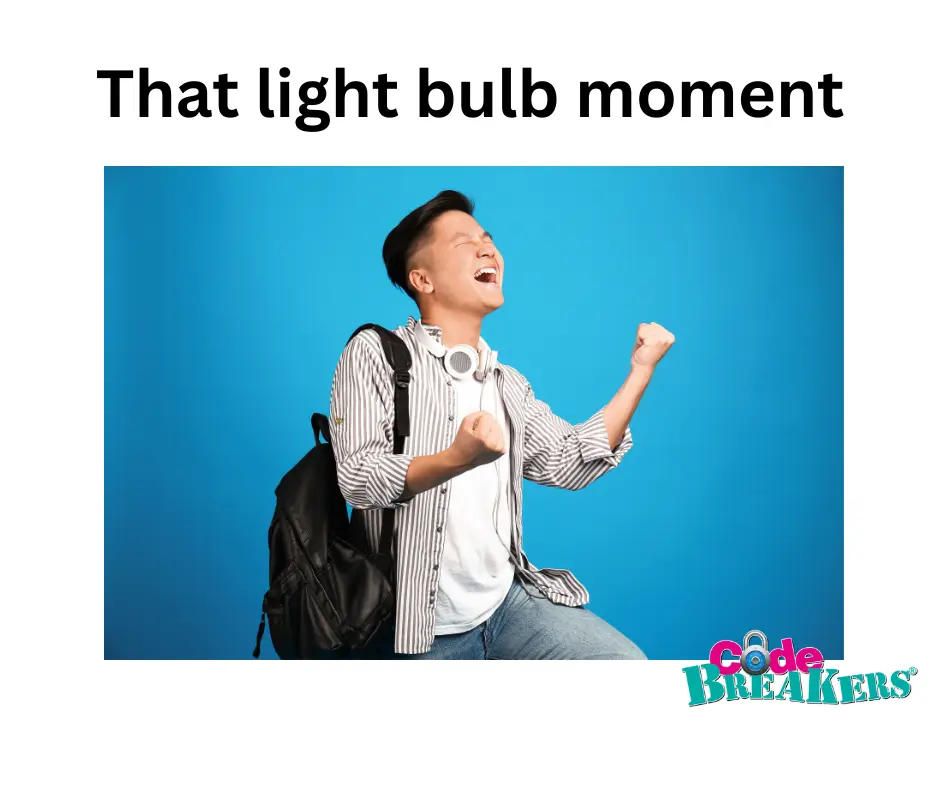
That 'aha' spelling moment
What's happening when spellers get that 'aha' moment?
As we come to the end of term it’s a great time to reflect on achievements. However, they don’t always need to be exam passes. It’s those small soft skills that are a great change.
I recently received a message from a parent that perfectly captures the heart of what CodeBreakers aims to achieve, not just progress in spelling sessions, but real, transferable understanding that students carry with them into everyday learning.
Here’s what my student’s parent shared:
“Just wanted to share some progress…
My child was doing a piece of homework today where they were writing 1st, 2nd, 3rd…
“/nd/… I’m doing that with Georgina” (CodeBreakers tutor), “it’s at the ending of second”. “and /st/ is at the end of first.”
“My child rarely makes any connection between their learning in spelling and anything they write. This is big progress!”
At first glance, this might seem like a small moment, a child linking a spelling pattern to a homework task. But for my student and many learners like them, it’s a breakthrough.
Why This Matters: Beyond the 1:1 Session
This moment tells us something powerful: My student is not just learning rules, they are beginning to understand patterns, apply them in context, and speak confidently about them. That shift, from passive learning to active awareness, is where long-term literacy skills take root. I can't stress the importance of active participation in sessions.
It also reflects something we emphasise in every CodeBreakers session: building metacognitive awareness. Students are taught not only what to learn, but how to notice, reflect, and apply their knowledge, whether they’re reading in class, writing at home, or spelling with a peer.
The Role of the Right Support
What made this breakthrough possible?
Consistency: My student has been working regularly through the CodeBreakers programme with me, their 1:1 specialist. That consistent exposure to structured, sequential learning helps build a strong foundation.
Connection: I don’t just teach spelling; I make it meaningful. I help my students to link the patterns and rules to real-life language and their experiences, moving beyond passive drills and into active worksheets and games, then into conversations that stick, providing sematic links.
Confidence: Because of this support, my student felt secure enough to pause during their homework, notice a spelling pattern, and confidently explain it out loud. That kind of metacognitive awareness grows through repeated, positive experiences of being right. I also hear this reported in classrooms too, from the schools which choose to use CodeBreakers.
Classroom Continuity: And just as crucially, my student has a fabulous Teaching Assistant who knows exactly which patterns are being worked on in the student’s CodeBreakers sessions. This TA plays an essential role in bringing the learning into the classroom, reinforcing it in real time through:
Auto-response cards that support quick, automatic recognition of letter patterns,
Sound-based prompts that encourage my student to listen for the correct spelling patterns as they speak and write,
And fun, quick games that make learning stick and help cement the patterns in memory.
Read more...

This kind of joined-up approach ensures my student’s learning doesn’t stop at the end of a 1:1 session. It’s echoed, reinforced, and made concrete throughout their day. It’s been wonderful to collaborate with this student’s school and have a joined-up approach. This progress has been seen in 6 short weeks and I am thrilled to see the student's progress and engagement.
A Takeaway for Teachers and Parents
As educators and caregivers, we often look for big milestones: improved test scores, fluent reading, perfect spelling. But sometimes the biggest indicators of growth come in these quiet, “off-the-cuff” moments, when a student connects the dots between structured learning and spontaneous discovery.
When students begin to say, “I remember learning that,” or “I know this because…” that’s where learning becomes lifelong.
So, if you ever wonder “Is this working?”, remember my student.
The moment a student sees their learning come alive outside of a tutoring/intervention session, that’s not just progress. That’s transformation.
Would you like to know more about how you can use CodeBreakers in your school?
I train teachers and TAs to deliver the CodeBreakers programme effectively in schools, 1:1 or small groups for 20 mins or 1 hr, you decide on the length of intervention sessions.
All teaching materials are provided and ready to go, no planning time required, means more teaching time.
Book a slot to discuss your school’s requirements-my office will remain open throughout the summer holidays.